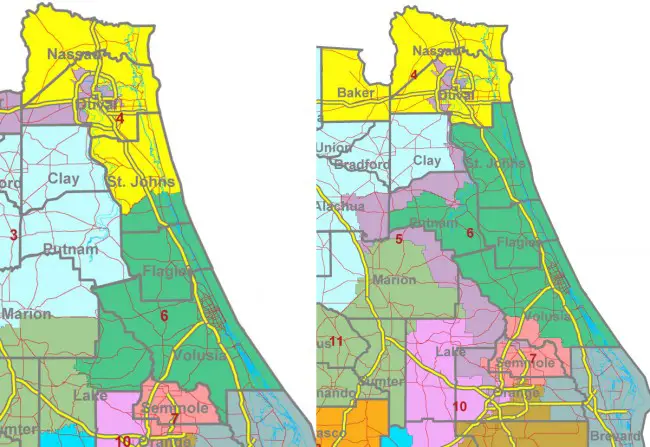
Changes to a proposed map of Florida’s 27 congressional districts emerged Wednesday, a day before key hearings in the House and Senate about how to comply with a court order finding the current map violates the anti-gerrymandering “Fair Districts” requirements. (See all the proposals here.)
One of the proposals would do what Sen. Travis Hutson wants: it would return all of St Johns County to Congressional District 6, which includes all of Flagler, as opposed to just a sliver of St. Johns.
That proposal would again tilt the district rightward, compared to the original base-map proposal. That original proposal would have shifted the district south, taking in all of Flagler and Volusia but dropping Putnam and most of St. Johns. Hutson objects, saying it splits St. Johns’s constituency while turning the district into a Central Florida district rather than a northeast district.
One hitch: the new proposal, by Rep. Mike Hill, R-Pensacola Beach, is no different than the current district map. Hill is filing it because he thinks the state Supreme Court overstepped its bounds by forcing the Legislature to draw new maps.
A second proposal by by Rep. Dave Kerner, D-Lake Worth, would mostly stick with the base-map proposal.
Meanwhile, a congresswoman whose district has been targeted to be radically redrawn made good on her threat to file a federal lawsuit trying to complicate the process.
The three amendments were filed to the proposed map Wednesday — two of them in the House and one in the Senate — as lawmakers prepared for meetings Thursday of the House Select Committee on Redistricting and the Senate Reapportionment Committee. Both panels will take up the same “base map” developed by staff to start discussions about the districts. Senate leaders have indicated that more than one hearing could be held if necessary.
Sen. Nancy Detert, R-Venice, filed a map that would reunite Sarasota County into a district with the coastal parts of Manatee County. Under the base map, Sarasota would be split between two districts, with the northern part of the county being combined with Manatee and parts of Hillsborough County and the southern part going into a largely agricultural district centered in the state’s interior.
Detert argues that splitting Sarasota County is not necessary to comply with a July 9 opinion from the Florida Supreme Court striking down eight congressional districts. The court said those districts, drawn in 2012, did not comply with a voter-approved “Fair Districts” constitutional amendment aimed at preventing gerrymandering.
“Our district was not included in the court case in the first place,” Detert said.
The amendment filed in the House by Kerner would continue to allow the districts of Congressman Ted Deutch and Congresswoman Lois Frankel — both Democrats — to run from north to south. The court asked lawmakers to redraw the districts, but said the Legislature didn’t necessarily have to use a “stacked” formation — with one district taking up most of the northern territory and another to the south.
Another House member filed an amendment that would go back to the initial map developed during the once-a-decade reapportionment process in 2012. That map has already been found unconstitutional by the courts, but Hill said the original pan should stand.
“I believe that map was as valid as any because of (lawmakers’) good-faith effort to put forward a map that would accurately reflect the change in our population,” he told The News Service of Florida.
Hill said that while lawmakers can consider changing maps that courts object to, justices went too far and tried to essentially draw the districts with the July ruling.
“The Supreme Court does not have that authority. That authority rests solely with the Legislature,” Hill said.
As lawmakers geared up for the Thursday meetings, Democratic Congresswoman Corrine Brown filed a lawsuit asking a federal court in Tallahassee to bar the state from using “any congressional redistricting plan that dilutes the voting strength of African Americans.” Brown has furiously fought the Florida Supreme Court’s ruling that her district should no longer run from Jacksonville in the north to Orlando in the south and should instead have an east-west orientation.
“The drawing and redrawing of Congresswoman Brown’s district, as required by the Florida Supreme Court’s opinion, carries with it the very real and imminent possibility of Congresswoman Brown’s constituents being deprived of the ability to elect a representative of their choice,” the lawsuit said.
Lawmakers started a special session Monday to deal with the congressional map, one of two such sessions they will hold this year. A session starting in October will lead to an overhaul of state Senate districts under a settlement between the Legislature and voting-rights organizations, like the League of Women Voters, that have criticized the redistricting process.
During a court hearing Wednesday in that case, Leon County Circuit Judge George S. Reynolds III said he would likely give lawmakers another attempt to draw a compliant Senate map if the one they craft during the October session falls short of meeting the constitutional requirements.
“We would argue that it’s our prerogative to try to do it in a constitutional manner,” said former Supreme Court Justice Raoul Cantero, who represents the Legislature.
Lawyers for the maps’ opponents say that could be acceptable, though they said they might at some point ask Reynolds to draw districts himself. The first draft of the Senate map was rejected by the Florida Supreme Court in 2012.
“We’re on the third go-around for the Legislature. … So if they get this one wrong, there would be an argument that maybe you’ve got to take charge of fixing it,” said David King, an attorney for the voting-rights groups.
–Brandon Larrabee, News Service of Florida, and FlaglerLive





























Anonymous says
Districts should not cut in half citys they should follow then and or county lines